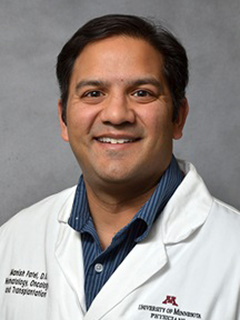October 9, 2020:
A Big Ten Cancer Research Consortium phase II study for adult patients with advanced salivary gland carcinoma that is androgen receptor positive (AR+), will test the combined therapy of the PD-1 inhibitor pembrolizumab and the androgen deprivation therapy goserelin. This multi-site study is now open to accrual at the University of Illinois Cancer Center (University of Illinois at Chicago); Holden Comprehensive Cancer Center, University of Iowa; University of Maryland Marlene and Stewart Greenebaum Comprehensive Cancer Center; University of Michigan Rogel Cancer Center; Masonic Cancer Center, University of Minnesota; Robert H. Lurie Comprehensive Cancer Center of Northwestern University; and University of Wisconsin Carbone Cancer Center.
The study, BTCRC-HN17-111, “Phase II trial of androgen deprivation therapy (ADT) and pembrolizumab for advanced stage androgen receptor-positive salivary gland carcinoma,” is being conducted to see whether blocking receptors in AR+ salivary gland tumors will cause the cells to stop growing or cause cell death.
Salivary gland tumors are rare, with an incidence of approximately 2.5 to 3 cases per 100,000 annually in the Western world, and account for 3 to 5 percent of all head and neck cancers. Currently, there is no standard therapy for treating this type of cancer. Patients with advanced AR+ salivary gland tumors are usually treated with either surgery, radiation, or chemotherapy.
“The objective of this study is to test the hypothesis that hormonal therapy with androgen deprivation therapy will increase the response rate to immunotherapy with pembrolizumab,” said Manish Patel, DO, sponsor-investigator of the study and a medical oncologist at the University of Minnesota Department of Medicine, Division of Hematology, Oncology and Transplantation. “What we will be looking at is the objective response rate or disease control with this combination in patients with androgen receptor positive salivary gland tumors.”
The androgen deprivation therapy goserelin is approved by the U.S. Food and Drug Administration to treat breast cancer and prostate cancer. It works by suppressing the pituitary gland from making hormones that stimulate both testosterone and estrogen. In this study, goserelin will be used to block the hormones that promote the growth of AR+ salivary gland tumors.
Pembrolizumab is a monoclonal antibody that blocks a pathway called PD-1 that cancer cells use to hide from the body’s immune system. By blocking this pathway, pembrolizumab helps the body’s immune system recognize and fight cancer cells. Pembrolizumab is approved by the FDA to treat several types of cancer.
The combination of pembrolizumab and goserelin to treat advanced AR+ salivary gland cancer has not been approved by the FDA and should be considered investigational.
“The idea behind this combination is that by using the androgen deprivation, we may manipulate the immune response to the tumor to simulate a more durable response for a greater proportion of the patients,” Dr. Patel said.
Blood, tissue, and saliva samples collected during the study will support correlative research.
“We are interested in understanding what is happening to the immune system with regard to treatment with androgen deprivation along with the new checkpoint blockade,” Dr. Patel said. “We will be collecting blood specimens at various points throughout the study. We will be collecting archival tissue prior to treatment, and for some patients we will collect a biopsy after treatment to understand the changes that happen in the tumor micro-environment with this combination therapy.”
Up to 20 subjects may participate in the study. Each subject will receive the combined therapy of pembrolizumab and goserelin. Goserelin will be administered as an implanted injected under the skin every four weeks and will be given two weeks prior to the first dose of pembrolizumab. Pembrolizumab will be given every three weeks intravenously. Participants will receive this combined therapy until their cancer progresses, they experience significant side effects, or they have received these study drugs for two years. Subjects may discontinue treatment at any time in consultation with their doctor.
To participate in the study, participants must be adults age 18 or older, with advanced AR+ salivary gland carcinoma, and not have been treated previously with hormonal therapy against the androgen receptor or with immunotherapy using the checkpoint blockade.
For more information about this research study, including full eligibility requirements, visit www.clinicaltrials.gov (study #NCT03942653).
This study is supported by Merck Sharpe & Dohme Corp. and TerSera.
About the Big Ten Cancer Research Consortium: The Big Ten Cancer Research Consortium was created in 2013 to transform the conduct of cancer research through collaborative, hypothesis-driven, highly translational oncology trials that leverage the scientific and clinical expertise of Big Ten universities. The goal of the Big Ten Cancer Research Consortium is to create a unique team-research culture to drive science rapidly from ideas to new approaches to cancer treatment. Within this innovative environment, today’s research leaders collaborate with and mentor the research leaders of tomorrow with the unified goal of improving the lives of all patients with cancer.
About the Big Ten Conference: The Big Ten Conference is an association of world-class universities whose member institutions share a common mission of research, graduate, professional and undergraduate teaching and public service. Founded in 1896, the Big Ten has sustained a comprehensive set of shared practices and policies that enforce the priority of academics in the lives of students competing in intercollegiate athletics and emphasize the values of integrity, fairness and competitiveness. The broad-based programs of the 14 Big Ten institutions will provide over $200 million in direct financial support to more than 9,800 students for more than 11,000 participation opportunities on 350 teams in 42 different sports. The Big Ten sponsors 28 official conference sports, 14 for men and 14 for women, including the addition of men’s ice hockey and men’s and women’s lacrosse since 2013. For more information, visit www.bigten.org.















Subscribe to the Big Ten CRC Newsletter X
X Facebook
Facebook YouTube
YouTube